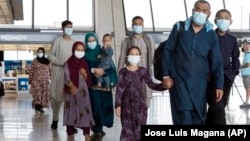A US court has for the time blocked plans by the government to end Temporary Protected Status (TPS) for Afghans in the country, granting at least a one-week reprieve to thousands of people at risk of deportation to Taliban-controlled Afghanistan.
The Court of Appeals for the Fourth Circuit in Richmond, Virginia, late on July 14 issued an administrative stay on the termination of TPS for Afghans until July 21, granting a request from immigration advocacy group CASA.
CASA filed for an emergency motion on July 14, the day the protected status for Afghans was to end.
The court did not provide a reason for its ruling. US administration will have until 11:59 p.m. on July 16 to respond.
The Department of Homeland Security (DHS) had declared on May 12 that TPS for Afghanistan would expire on July 14, with the decision affecting an estimated 9,000 to 12,000 Afghans currently living and working legally in the United States under the program.
Rights groups and Afghan refugees condemned the decision to allow the protections to expire, warning that it puts lives in jeopardy and ignores the realities on the ground in Afghanistan.
The DHS at the time said the termination of TPS was based on its assessment that conditions in Afghanistan have "improved sufficiently" and no longer meet the statutory requirements for TPS.
DHS Secretary Kristi Noem had "determined that, overall, there are notable improvements in the security and economic situation such that requiring the return of Afghan nationals to Afghanistan does not pose a threat to their personal safety due to armed conflict or extraordinary and temporary conditions,” a DHS statement said in May.
That statement said Noem had also determined that permitting Afghan nationals to remain temporarily in the United States is "contrary to the national interest of the United States."
The department cited national security and fraud concerns, claiming some individuals under TPS are being investigated for threats to public safety and national security.
But Afghans living in the United States under TPS said they will be in danger if they return to Afghanistan.
"It is true that there is relative security, but there are many problems," an Afghan man who spoke on condition of anonymity told RFE/RL's Radio Azadi.
"Right now, former government soldiers are being arrested, disappeared, and even killed," said the man, who lives in Texas with his family of four.
Advocates for the Afghans argue that many of them assisted the US military or other organizations in Afghanistan and thus would be subject to harsh treatment by the hard-line Taliban rulers, who have not been recognized as a legitimate government by Washington and much of the rest of the world.
Those fears are rooted in the dramatic changes Afghanistan has undergone since the Taliban's return to power in 2021. Following the withdrawal of US and NATO troops, Taliban insurgents seized Kabul, toppling the Western-backed Afghan government.
Since then, the Taliban has imposed a strict interpretation of Islamic law, rolling back rights and freedoms, especially for women and girls, who are now barred from secondary education and most employment.
Reports from the UN and human rights organizations have documented widespread human rights abuses, including extrajudicial killings, enforced disappearances, torture, and public floggings, particularly targeting former government officials, security personnel, and dissenters.
A total of some 180,000 Afghans fled their home country and had come to the United States since the Taliban retook control of the country in August 2021. Many of those are not under TPS status, having applied for or received other forms of protection, such as political asylum, and are not subject to the TPS termination order.
The DHS has granted the Temporary Protected Status to people from a number of countries who are now in the United States, allowing them to work legally in the country but does not provide a route to citizenship. DHS reviews the status every 18 months.
The US administration has moved to remove protected status for seven countries, including Afghanistan. The largest numbers of people affected are from Venezuela and Haiti.










